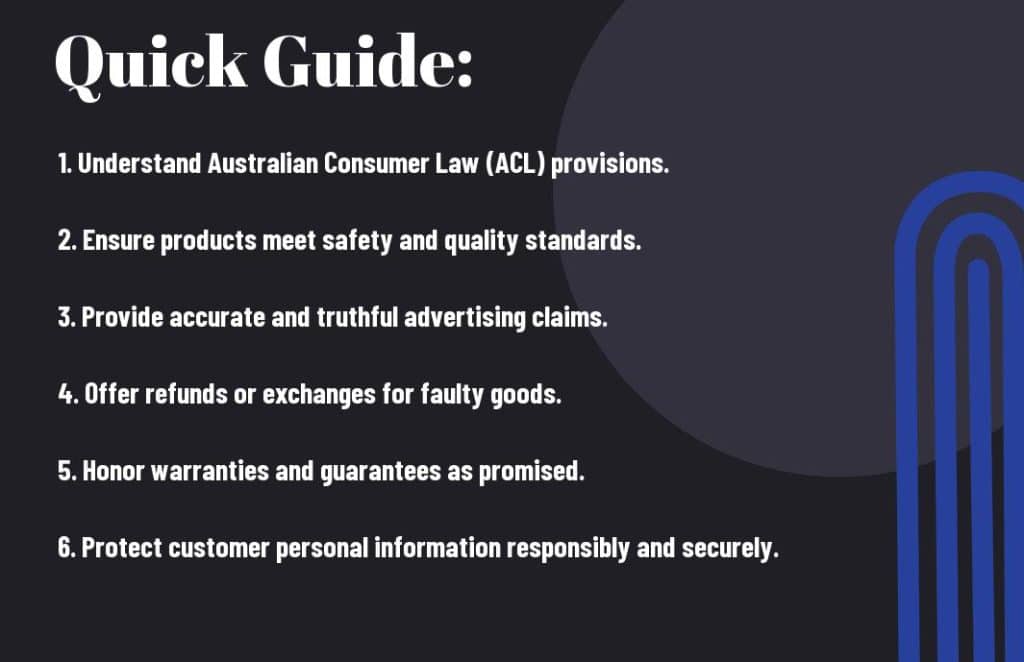What are the consumer laws I need to comply with as an Australian business?
Just like any business operating in Australia, you need to be aware of the consumer laws that govern your operations and protect your customers. Understanding these regulations not only helps you avoid legal issues but also builds trust with your clientele. From the Australian Consumer Law (ACL) to specific industry codes, it’s necessary to know what is expected of you to ensure fair trading practices. This guide will walk you through the key consumer laws you should comply with to ensure your business thrives in a competitive marketplace.

Key Takeaways:
- Australian Consumer Law (ACL): Businesses must comply with the ACL, which provides protections against unfair practices and ensures consumers have rights related to goods and services, including guarantees and refunds.
- Misleading Conduct: It’s crucial to avoid any forms of misleading or deceptive conduct in advertising and marketing materials, as this can result in severe penalties.
- Privacy Regulations: Follow the Privacy Act to ensure the appropriate collection, handling, and storage of personal information from consumers, maintaining their trust and legal compliance.

Types of Consumer Laws
For every Australian business, understanding the types of consumer laws is vital to ensure compliance and protect your interests. These laws can be broadly categorized into several areas:
| Consumer Rights | Regulates the rights of consumers in their transactions. |
| Product Safety | Ensures that products sold are safe for consumers. |
| Misleading Conduct | Prohibits false or misleading representations about products and services. |
| Unfair Trading | Protects consumers from unfair business practices. |
| Refunds and Returns | Outlines rules around returns, refunds, and exchanges. |
Knowing your obligations under these different types of consumer laws can guide you in maintaining ethical and lawful business practices.
Australian Consumer Law (ACL)
Some of the main provisions of the Australian Consumer Law (ACL) include ensuring consumers have rights related to product quality, performance, and fitness for purpose. This law applies to all Australian businesses and is designed to promote fair trade and competition while protecting consumer rights.
Other Relevant Regulations
If you operate a business in Australia, other relevant regulations also apply beyond the ACL. These can include advertising standards, privacy laws, and industry-specific regulations that govern how you conduct your business.
Regulations such as the Spam Act and the Privacy Act are important as they dictate how you can communicate with your customers and handle their data. Adhering to these regulations not only keeps you compliant but also builds trust with your customers by ensuring their privacy and security are respected.
Key Compliance Requirements
Some of the key compliance requirements for Australian businesses include adhering to consumer rights and guarantees, avoiding misleading or deceptive conduct, and ensuring fair trading practices. Your obligations are defined under the Australian Consumer Law, which emphasizes protecting consumers and fostering a competitive marketplace. Understanding these requirements will help you maintain compliance, build consumer trust, and avoid potential penalties.
Consumer Rights and Guarantees
Assuming you engage in trade, it is imperative to be aware that consumers have specific rights when they purchase goods or services from your business. These rights include guarantees of acceptable quality, fitness for purpose, and conformity with descriptions. Being informed about these rights enables you to provide better service and avoid complaints.
Misleading and Deceptive Conduct
There’s a significant emphasis on avoiding misleading and deceptive conduct in your advertising and sales practices. The Australian Consumer Law prohibits any representations that could lead consumers to form false beliefs about your products or services, which means you must ensure all information is accurate and substantiated.
Misleading conduct can involve false advertising, ambiguous terms, or any action that would cause consumers to be misled about the nature of your products or services. To protect your business, ensure that your marketing and promotional materials accurately reflect what you offer and that you don’t exaggerate claims. This practice not only fortifies your reputation but also aligns your business with legal requirements.
Tips for Compliance
To ensure compliance with consumer laws as an Australian business, consider the following tips:
- Stay informed about current laws and regulations.
- Review your advertising and marketing materials regularly.
- Implement transparent return and refund policies.
- Maintain accurate records of consumer transactions.
- Encourage feedback from customers for continual improvement.
Assume that staying proactive can significantly reduce the risk of non-compliance.
Regular Training for Staff
With regular training, you can ensure that your employees understand consumer rights and your business obligations. This training should cover relevant laws, company policies, and best practices to foster a consumer-oriented culture.
Clear Communication with Consumers
One imperative aspect of compliance is maintaining clear communication with your consumers. Transparency in your business practices builds trust and ensures that your customers are aware of their rights.
Another important element is providing detailed information about your products and services, including clear descriptions, pricing, and terms of sale. You should also be transparent about warranties, refund policies, and dispute resolution processes to ensure customers know exactly what to expect from your business. This clarity helps to mitigate misunderstandings and fosters a positive relationship between you and your consumers.
Step-by-Step Compliance Process
Now that you understand the importance of consumer laws, you can follow a systematic approach to ensure compliance. This involves assessing your current practices, implementing necessary measures, and monitoring ongoing compliance. The process can be organized into the following steps:
| Step | Description |
|---|---|
| 1. Assess | Evaluate your current business practices against consumer laws. |
| 2. Implement | Adopt compliance measures to align with legal requirements. |
| 3. Monitor | Regularly review practices for sustained compliance. |
Assessing Business Practices
For effective compliance, you should start by assessing your current business practices. This involves reviewing your sales methods, marketing strategies, and customer service protocols to identify areas where you may fall short of legal requirements. Understanding your obligations will enable you to pinpoint necessary adjustments and avoid potential violations.
Implementing Compliance Measures
Compliance with consumer laws often requires adjustments to your practices. This can involve updating policies, training staff, or integrating compliance systems into your operations. Ensuring that all aspects of your business align with legal standards is vital for protecting both your business and your customers.
For instance, you might need to revise your return policies to match consumer guarantees, provide clearer product descriptions, or ensure that your advertising is not misleading. Training your team on these changes will also enhance your compliance efforts. Regular audits and consultations with legal experts can further safeguard your business against potential breaches of consumer laws.
Factors Influencing Compliance
After establishing your business, several factors can influence your compliance with consumer laws. Understanding these factors can help you navigate the legal landscape effectively:
- Business structure
- Industry regulations
- Market demands
- Consumer feedback
This understanding will assist you in making informed decisions and ensuring compliance with relevant laws.
Business Size and Industry
To ensure compliance with consumer laws, it’s necessary to consider your business size and the industry you operate in. Larger businesses often face stricter regulations and may need to implement comprehensive compliance measures, while smaller businesses may have more flexibility but still need to adhere to basic consumer protections.
Consumer Expectations
Consumer expectations play a significant role in shaping your compliance strategy. Understanding what your customers anticipate in terms of product quality, pricing transparency, and customer service can impact your business’s reputation and adherence to consumer laws.
This means you should consistently evaluate your offerings, ensuring they meet the standards expected by consumers. By aligning your business practices with consumer expectations, you not only enhance customer satisfaction but also reduce the risk of legal disputes and enhance your overall compliance with relevant consumer laws.
Pros and Cons of Compliance
Many businesses face decisions when it comes to compliance with consumer laws. Evaluating the pros and cons can help you navigate these necessary requirements effectively.
| Pros | Cons |
|---|---|
| Enhances customer trust and loyalty | Requires time and resources for proper training |
| Minimizes legal risks and penalties | Compliance can be complicated and confusing |
| Improves market competitiveness | May limit certain business practices |
| Encourages ethical business practices | Can incur initial compliance costs |
| Provides a clear framework for operations | Regular updates to laws necessitate ongoing attention |
Benefits of Adhering to Consumer Laws
Adhering to consumer laws not only helps you meet legal requirements but also builds a solid reputation for your business. It fosters customer loyalty and trust, which can lead to long-term relationships and increased sales. Additionally, compliance can enhance your brand image and establish a competitive edge in the market, as customers gravitate towards businesses that prioritize their protection and rights.
Challenges and Risks
For many businesses, navigating the landscape of consumer laws can pose challenges. You may encounter difficulties in interpreting complex regulations or may need to invest significant resources in compliance efforts. Non-compliance also carries risks, including financial penalties and damage to your reputation, which can negatively affect your business operations.
Understanding the challenges and risks associated with consumer law compliance can help you formulate effective strategies to address them. Staying updated on legislative changes and seeking legal counsel can mitigate some of these obstacles, ensuring your business adheres to laws while remaining agile in a competitive market. Also, investing in employee training can alleviate confusion and ensure everyone in your organization is aligned with compliance requirements, ultimately protecting your interests and those of your customers.
Summing up
Ultimately, as an Australian business, you must comply with several consumer laws, including the Australian Consumer Law (ACL), which covers product safety, misleading conduct, and consumer rights. Additionally, ensure that your business adheres to fair trading practices and complies with specific regulations regarding refunds, warranties, and representations. Familiarizing yourself with these laws not only protects your customers but also safeguards your business from potential legal issues. Staying informed and proactive in understanding your obligations will enhance your reputation and build trust with your clientele.
FAQ
Q: What consumer laws apply to my business as an Australian retailer?
A: As an Australian retailer, you must comply with the Australian Consumer Law (ACL), which is part of the Competition and Consumer Act 2010. The ACL provides protection for consumers, establishing their rights and outlining your responsibilities regarding fair trading, product safety, and consumer guarantees. Key provisions include ensuring that products are of acceptable quality, accurately described, and fit for purpose. Additionally, misleading or deceptive conduct is prohibited, and you must provide remedies such as repairs, replacements, or refunds for faulty products.
Q: Do I need to provide warranties or guarantees on my products?
A: Under the Australian Consumer Law, businesses are required to provide certain guarantees regarding goods and services, which function similarly to warranties. These guarantees include ensuring that goods are of acceptable quality, match their description, and are fit for purpose. While it is not mandatory to provide a written warranty, if you do offer one, it must provide consumers with additional rights beyond those stipulated by the ACL, and it should be clearly communicated and honored. Failure to do so may result in penalties or claims from consumers.
Q: What should I do if I receive a complaint from a consumer?
A: If you receive a complaint from a consumer, it’s important to address it promptly and professionally. First, listen to the consumer’s concerns and gather all relevant information about the issue. Evaluate the complaint against your obligations under the Australian Consumer Law. If the product or service is found to be faulty or not in accordance with the consumer guarantees, you may need to provide a remedy, such as a refund, repair, or replacement. Ensure you document the complaint and your response for future reference and maintain clear communication with the consumer throughout the process.
Source article: https://smallbiztoolbox.com.au/what-are-the-consumer-laws-i-need-to-comply-with-as-an-australian-business/







